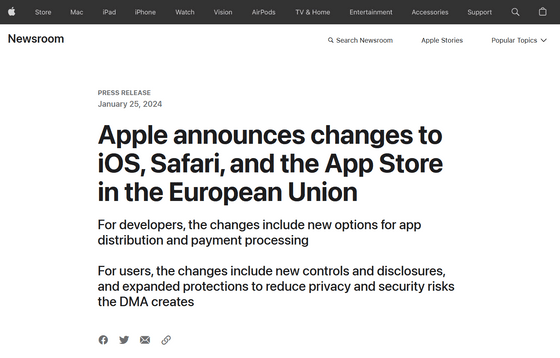Apple finally allows full versions of Chrome and Firefox to run on iPhone

It has been revealed that Apple has allowed browser engines other than Webkit in iOS 17.4, allowing browsers other than Safari such as Chrome, Firefox, and Opera to work perfectly. This is a response to the implementation of the EU's Digital Markets Act (DMA) and only applies to users in the EU.
Apple announces changes to iOS, Safari, and the App Store in the European Union - Apple

Update on apps distributed in the European Union - Support - Apple Developer
Using alternative browser engines in the European Union - Support - Apple Developer
https://developer.apple.com/support/alternative-browser-engines/
Apple is allowing alternative browser engines in iOS 17.4 — but only in the EU - The Verge
https://www.theverge.com/2024/1/25/24050478/apple-ios-17-4-browser-engines-eu
Apple has allowed a variety of browsers to run on iOS, but the only browser engine it has allowed is Webkit. For this reason, Chrome and Edge, which run on the Chromium engine, and Firefox, which runs on the Gecko engine, were forced to run on Webkit on iOS, and many features and extensions did not work.
However, in the beta version of iOS 17.4 announced on January 26, 2024, we found that Apple is allowing the use of engines other than Webkit for the first time in history. Apple says anyone developing a browser app or in-app browser can use an engine other than Webkit if they wish.
Each developer is approved for use by Apple only if they meet certain standards and commit to continued privacy and security mitigations.

Apple also revealed that users who open Safari for the first time will be prompted to select a default browser. The DMA stipulates that users should be able to uninstall preinstalled apps, such as web browsers that direct them to products and services from companies that are designated as 'gatekeepers,' and in Apple's case preinstalled on iOS. This is the case with Safari, but it is not clear at the time of writing whether Apple will allow Safari to be uninstalled.
Apple is clearly angry in its release announcing the new feature, explaining that prompting you to choose a default browser 'disrupts your experience when you open Safari for the first time.' .

The browser engine, which is 'constantly exposed to potentially malicious content and able to visualize sensitive user data, can be one of the most common attack vectors for malicious actors.' . It set a number of requirements , including blocking cookies by default and prioritizing fixing vulnerabilities over developing new features, and stated that only developers who committed to these requirements would be allowed to implement alternative browser engines.
Related Posts:
in Software, Posted by log1p_kr







